
by Mike Adams
the Health Ranger
April 02, 2012
from
NaturalNews Website
The Hunger Games is a wildly popular new movie set in a dystopian future
where an all-powerful, high-tech centralized government rules over
"districts" of impoverished populations barely surviving in third-world
conditions.
The film, based on
the book of the same name by Suzanne
Collins (listen
audio-book), is important to understand because it depicts the
very future that
the global elite are trying to create.
In fact, much of
what is shown in The Hunger Games has already begun (see far below).
The film is set 74 years after a popular uprising that failed to overthrow a
corrupt, centralized federal government.
As punishment for the attempted uprising, the
all-powerful government now requires each of 12 districts to "volunteer" a
young girl and boy each year to participate in The Hunger Games - a blood-sport "breads and circuses"
(as in any "Empire")
event that serves as the opiate of the
masses to distract society from the fact that they are all slaves living
under tyranny.
Spoiler alert: This
article reveals plot elements that may spoil the movie for you if you
haven't yet seen it.
The central themes of
domination and control
The movie reflects numerous central themes of government control over the
masses, including:
-
Control over food
Residents of the 12 districts are not
allowed to eat more
food than they are allotted by the government.
Being caught catching a squirrel for food results in severe
punishment.
-
Control over land
The 12 districts are fenced off with
high-voltage power lines, much like you might find in North Korea
today. Most of the world is "conserved" as wild forest and
grasslands, with humans only being allowed to populate confined
regions where resources are sparse and starvation is a daily
reality.
-
Control over the media
The government
controls all media, and
every broadcast is a staged theatrical event, completely fabricated
by the government to serve the interests of the government itself.
This, of course, is a reflection of present-day mainstream media
which is completely whored out to corporate and political interests.
-
Control of technology
While the masses live in squalor, the
techno-elite enjoy advanced hovercraft ships and live in gleaming
high-tech cities. Advancements in medicine, 3D displays and weapons
systems are available only to the centralized government, never to
the People. Also in the film,
RFID chips are used to track the game
participants.
-
Control of DNA
Residents of the districts are
identified through the taking of DNA blood samples. The government
stores their DNA in a database in order to track and identify
individuals. Insects are genetically engineered to serve as weapons,
such as GMO wasps that cause wild hallucinations to those who are
stung.
-
Control over life itself
The government toys with human life and
seems to be amused by expressing heartless power over the masses.
Their priorities are simultaneously focused on fashion, status and
meaningless cuisine. In one scene, when the teenage girl (Katniss
Everdeen) is trying to ask her mentor how she might survive the
games, her elitists coordinator can only spout about how much she
loves "chocolate truffles" and why they should all enjoy a round of
desserts.
A parade of fashion,
makeup and style gone wild
The style and fashion of the elite class who live in the high-tech cities
seems to be echoed right out of a modern-day parade.
People are adorned with bright, extravagant
clothing and accessories, and they're painted up in outlandish makeup and
hair color. They literally prance around like frolicking maniacal members of
royalty, and they experience great joy from causing others to suffer.
The government-worshipping elite class see themselves as intellectually
superior to everyone else, yet they lack any real-world skills.
They also
lack anything resembling ethics, and they see nothing wrong with cheating or
lying their way to positions of ever greater power in their warped society.
Enslavement through
the illusion of hope
At the top of the government, the leader played by Donald Sutherland is a
Rockefeller-type master of deception and
human emotions.
As he explains in the film, the purpose of The
Hunger Games is to keep people enslaved while giving them "a little hope,
but not too much." A little hope keeps the enslaved masses in line, but too
much hope might actually make them think they have real power.
The threat of government violence against the enslaved masses is carried out
by a class of enforcers who, in contrast to most other dystopian films, are
actually clothed in white, not black. They are the TSA of The Hunger Games,
and their job is to oppress the people, bash in a few heads, and remind the
masses who's really in charge.
One can't help but notice in this film that the elite class of prancing
government worshipers is the logical extension of today's irrational worship
of government as the savior of society. Where government is put in charge of
everything, the People are forever enslaved.
And that seems to be the goal of the
government-worshippers in society today who desire to make all people
dependent on the government, hand over all power to the government, and
destroy individual human liberties (and the Bill of Rights).
It is no coincidence that the enslaved masses in
The Hunger Games are entirely disarmed and only the government is allowed to
own high-tech weaponry. This is a key provision of the leftist "anti-gun"
movement witnessed in society today, which says that all guns should only be
in the hands of government, not individuals.
Such a centralization of weaponry in the hands
of corrupt government, of course, only leads to tyranny, as history
repeatedly shows.
Human dignity
Most interesting to me is the idea that government elitists have no ethics,
no morals and no basic dignity.
In contrast, the only real expression of dignity
comes from the District 12 volunteer, Katniss Everdeen (the female lead).
She enjoys a closeness with nature and a respect for life. When other
participants in The Hunger Games are killed around her, she shows them
respect with a makeshift burial ceremony. She only takes life as a last
resort, yet she's also quick to act out of self defense, and she's willing
to take action to kill others if they are truly intent on killing her.
This reflects a fundamental human right to self defense. When we are
attacked, we have the right to hold our ground and return fire as her
character demonstrates several times throughout the film. By doing so, she
saves her life and ultimately shows the elitist government that it cannot
control her.
That point comes out strongly at the end of the games, when she and her male
partner are the last two survivors.
The elitists government commands them to try to
kill each other so that only one victor emerges. But instead of giving in to
this command, the two decide to eat poison berries together and thus
demonstrate to the global audience watching the event (which is practically
the entire population) that the government shall not have the freedom to
decide when we live or die, and that even a slave can still decide when to
end their own life, independent from an oppressive government regime.
Unexpectedly, the government suddenly halts the games before the two can eat
the berries, announcing them both as winners.
This is obviously a last-ditch effort to make
sure no one expresses any power over their own lives - not even the power to
end your own life because such expression of individual power would
embarrass the government.
Throughout the film (and the book), the government is obsessed with total
oppression of the people, denying them food and resources and carrying out
mind games against them that sap their courage and convince them they have
no personal power.
The Hunger
Games is
coming true in America today
When watching The Hunger Games, you can't help but think about the recent
armed raids on Rawesome Foods in California.
There,
armed government thugs confiscated and destroyed
$50,000 worth of food and poured gallons of raw milk down the drain even
while a food bank that could have used all that food was right next door.
This destruction of food carried out by the government of California is also
routinely carried out by the oppressive government in The Hunger Games. One
of the most powerful strategies for total government domination is to deny
people access to real food. That's exactly what we're seeing today in the
government's attacks on raw milk, raw almonds and other nutritious foods.
In Michigan, for example, state bureaucrats
there have announced their plan to start destroying all the pig livestock of
small, local ranchers and
arrest them as felons.
We also see in society today a growing class of the ruling elite who express
total disdain for humanity, the natural world or anything resembling dignity
or ethics. This is perhaps best reflected in the philosophy of Goldman
Sachs, a financial investment giant so steeped in the culture of greed that
they reportedly think of their own customers as total idiots to be viciously
exploited for dishonest profit.
We also see the key elements of tyranny and oppression reflected in
the Obama administration, where Obama himself signed
the NDAA on New Year's Eve,
2011.
This law nullifies the Bill of Rights and
eliminates any right to due process for Americans. It allows the government
to arrest, detain, interrogate and torture any person, for any reason, even
if they are never charged with a crime. It really is like something ripped
right out of a dystopian sci-fi film.
The mass population, meanwhile, seems to
have no idea this has already been signed
into law.
Similarly, on March 16 of this year, President Obama signed into effect an
executive order that seizes control over all food resources across the
country, including food, seeds, livestock, farm equipment, food processing
facilities, and animal feed.
This is written in clear English,
right in the
order itself.
Once again, virtually the entire U.S. population seems to have no idea that
this executive order was signed by Obama.
In modern society, as in The
Hunger Games film, most people live in a world of delusion, oblivious to the
reality of how government is creepily expanding into a totalitarian
dictatorship with each passing day.
We are already living
in the early stages of The Hunger Games
The real kicker in all this is that, to a great extent, we have already
begun to live in the early stages of a "Hunger Games" society. Those who
worship government and believe in total government power over the People are
pushing us in that direction every single day.
Here are other signs of a Hunger Games type of government growing all around
us:
-
The TSA reaching down your pants and
calling it "security"
-
Staged false flag security events
to keep people afraid
-
Janet Napolitano on giant TV screens at
Wal-Mart
warning everyone to spy on their neighbors
and only trust government
-
Armed government raids on farms and food
distribution centers
-
Corporate control over seeds and all
intellectual property
-
The push to disarm the People and
centralize all weapons in the hands of government
-
Mad science genetic engineering of crops
and animals
-
The total theater of fabricated
"humanitarian" causes (KONY
2012) which are really nothing more than
a tactic to get public support for mass murder by governments
-
The total worshipping of sports figures
and sports events by the dumbed-down masses who watch football,
basketball and the UFC while having no clue whatsoever that their
government is raping their future and destroying their liberties.
Big Government will
accelerate us into a Hunger Games dystopian future
Ask yourself:
-
What political position does all this sound like?
-
End the Second Amendment, put government in
charge of all food, give up liberties in the name of security, surrender
individual power to state power... ring a bell?
It's the platform of
America's political elite, whether you're talking about the left or the
right.
Both political parties believe in big (and bigger) government, dis-empowered
people, and total government control over all resources (including land).
Only people who believe in small, limited government can reverse this trend.
A small government is a safe
government, as any government that gets too big and too powerful becomes a
clear and present danger to the People.
Each day that our government becomes larger and more powerful - which almost
automatically happens following
staged terror events such as 9/11 - we are
hurled ever close to a Hunger Games type of future reality.
Let us hope that We the People can stop the insanity of bad government and
find a way to restore liberty before this fictional movie called "The Hunger
Games" becomes far too real for comfort.
Deep Secrets of 'The Hunger Games' Exposed
by
TheAlexJonesChannel
March 27, 2012
from
YouTube Website
Alex further breaks down new film that depicts possible police state
future
where a powerful few run the whole country and the citizens are at their
mercy.
"Hunger Games"
...and
Fourth-Turning America
by Administrator
April 22, 2012
from
TheBurningPlatform Website
|
It looks like I’m not the only
one who sees parallels between the Hunger Games books and movie and
The Fourth Turning.
Our good friend Neil Howe just
made this post on his blog.
I always love to see the
insights of the master.
He picked up things that I
never even considered.
I highly recommend
The Hunger Games and
The Fourth Turning to anyone
who wants to better understand what will happen in the next 15
years. |
So why has The Hunger Games broken so many box-office records in its first
few weeks in theaters?
Sure, the trilogy was a huge YA reader hit
before it became a movie. But the books weren’t exactly Tolkien, nor did
they have the same celebrity status as the Harry Potter series.
And even if the books did generate a lot of buzz
behind the movie, that just begs another question:
Why was the trilogy so popular to begin
with?
I have no idea. But I do think there are several
themes in the film that strike an obvious resonance with 4T America.
Theme One is the overwhelming imagery of the 1930s. In the film, we see
images either of America’s dire want and deprivation - think of dirt-eating
Appalachia before the TVA arrived - or we see images of National
Socialism triumphant. On the one hand, scenes of semi-starved District
12 are deliberately filmed as a black-and-white evocation of rural America
in the middle of the Great Depression.
Think of the
Time Magazine’s cover picture for
October 13, 2008: A stark photo of breadlines in the early 1930s.
On the other hand, the computer-assisted scenes of the Capitol of Panem look
like Berlin as it might have been redesigned by Nazi architect Albert Speer.
Fortunately, history did not allow him time to complete this task.
He did a brilliant job, however, with the
Nuremberg rallies, which look like Panem’s Capitol on a smaller scale. And
what isn’t directly Nazi-inspired comes from Art Deco or Art Nouveau.
I’m certainly not the first one to point this out: See this article in
the
Atlantic for example or
this very nice blog post. I’ve even seen a
YouTube
video pointing to the striking similarity between the Hunger Games
Mockingjay pin and Herman Goering’s Luftwaffe badge:
I’ll show a couple of examples here, the most
striking of which is the CGI movie image of “Avenue of the Tributes.”
The insignia for each district look disturbingly
similar to badges handed out by the U.S. National Recovery Administration
(NRA). Note btw the task assigned to District One: “Luxury.”
Hey, it’s a job and someone’s got to do it.
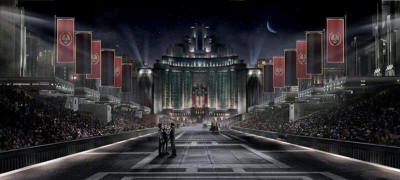
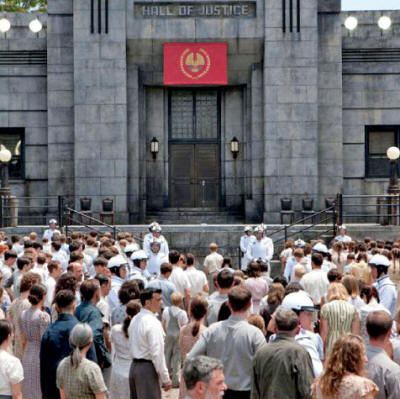
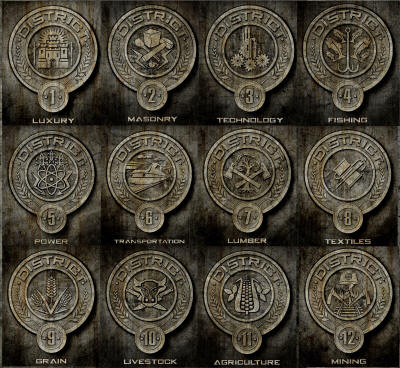
Why is this important?
Because the specter of National Socialism loomed
large over America at the depths of the Great Depression. As government
aggregated greater authority under FDR, many suggested (both on the populist
left and the authoritarian right) that perhaps government should go further.
In 1935 Sinclair Lewis wrote the novel
It Can’t Happen Here about a fascist take-over of the United States,
which was popular enough to be turned into a stage play in 1936. In Lewis’
novel, it was not so much that large numbers of people really wanted a
dictator.
It was just that no one any longer cared much
for the liberal and democratic alternative.
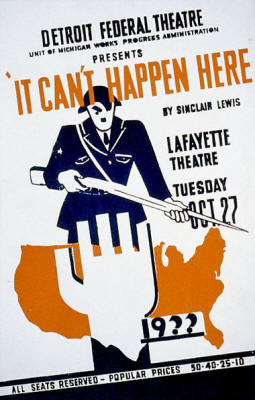
Theme Two is the imagery of a vast gap or
distance between the privileged and the subjected.
By most calculations, inequality by income in
the United States (as measured by the Gini Coefficient) has recently reached
the highest levels since the late-1920s and 1930s. In Hunger Games,
the rich are hi-tech and garish. The poor are resilient and plain.
In the OWS era, the relevance is clear.
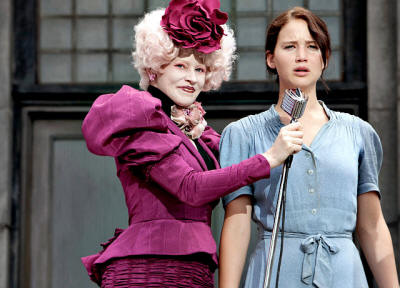
Theme Three is the imagery of a staged yet
savage competition among the young for survival.
I think Hunger Games can be read as a
metaphor for team-working and risk-averse Millennials entering a young-adult
economy defined by survivalist Gen-Xers, who are accustomed to competing
against each other in a no-holds-barred, winner-takes-all economy without
safety nets. Gen-Xers know all about Survival Games.
They think nothing of working for businesses
governed by the Jack Welch managerial philosophy - which is to fire X
percent of your workers every year “pour encourager les autres.”
Life is a gigantic Las Vegas casino.
”May the odds be ever in your favor.”
How X can you get? If Millennials fear anything,
it is this future.
How things have changed. When Boomers were young, William Golding wrote a
much-discussed novel about kids killing each other that was quickly turned
in a movie. It was called Lord of the Flies.
And why were the kids killing each other?
Because they wanted to. Because they were accidentally separated from the
adults who would otherwise have enforced order and restrained them.
Hunger Games turns the story entirely around. In
this world, it’s the adults who deliberately stage the teen-on-teen
gladiatorial contests. Hunger Games is by no means the first in this genre.
During the Gen-X youth era, we’ve seen novels
and movies like The Long Walk (Stephen King) and Battle Royale (a ‘90s
Japanese classic).
And how many Xer “reality shows” have followed
this same basic model - with Donald Trump or Simon Cowell or some other
middle-aging Boomer yelling “you’re fired” at a young person? The number is
beyond counting.
If you’ve seen the film, then you recall the scene where the
competition-trained blond jocks chase down and kill an unseen screaming
victim. An image came to my mind: Karate Kid I (1984), where the Aryan Cobra
Kai kids (dressed in skeleton uniforms) chase down and catch Daniel-san and
would have beaten him to a pulp had not Mr. Miyagi intervened.
This enormously popular movie persuaded
countless millions of young Gen-Xers to practice martial arts, buy a gun, or
do just about anything to defend themselves in a friendless world.
But here’s what’s changing. In today’s new 4T era, what felt OK or normal
for young Gen-Xers seems outrageous and unacceptable for young Millennials.
For a generation of kids so fussed-over and
protected - now to be sent out with bowie knives and machetes to eviscerate
each other from throat to gut? No, the line has to be drawn somewhere. And
this is what adds a whole new edge (so to speak) to the movie.
I originally had a Theme Four in mind, which is the horrifying Oprah-style
interviews of young victims about to be sent to their death. Here is a
glimpse of modern American decadence that deserves fuller treatment. In the
heyday of imperial Rome, gladiators once shouted “morituri
te salutant!” to the clamoring
coliseum crowds (we who are about to die salute you).
In Hunger Games, the contestants confess
personal secrets like they were on Jimmy Fallon’s ever-nice late-night show.
The effect is truly chilling. But the hour is
growing late...





